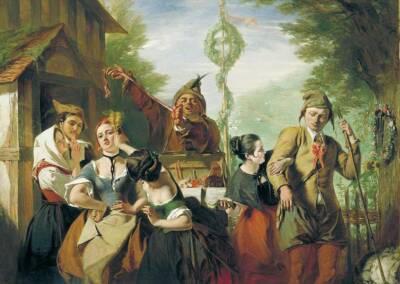In this “Summer Tale,” the author experiences a season of renewal, revisiting Shakespeare in a way he had not intended.
An ancient college friend visited Buffalo recently. I hadn’t seen him for a number of years and was eager to catch up. Looking back at our education after so many years, what did he make of our undergraduate curriculum? Had it enriched our lives?

Well, my old roommate– I sometimes call him “Judge-Mental” — is a Shakespeare scholar, and he proceeded to give me a rigorous critical lecture on The Winter’s Tale. I was tempted to say that rigor sometimes becomes rigor mortis.
I had written an essay about the play in our archaeological past, but had forgotten just about all of it, except the final scene when the Queen of Sicily, presumed to be dead for sixteen years, appears as a statue and then comes to life. Who could forget this redemptive comedy of rebirth?
Although the setting was pleasant – a light summer breeze at twilight, a bottle of Napa Valley wine, and a treasured friend across a table on my small deck – I found myself becoming a footnote as I realized how little knowledge I retained, though the semi-trauma of demanding grades and punishing tests remained.
I was on the verge of telling him that I wanted to know about his life and our generation, not the Queen of Sicily’s dormant state. Civility prevailed, and I began later to think how Shakespeare might be taught in an up to date way to those too young and media-oriented to grasp the bard’s linguistic complexity and those in their twilight years who had forgotten whatever they might have known beyond the anguish of reading Julius Caesar as a high school ritual.
So: I watched several lively YouTube productions of The Winter’s Tale (May 11, 1611), Royal Shakespeare Company (“woke”?) performances, consulted Cliffnotes, Wikipedia articles, Google-mined information, some graphic versions, even Classics Illustrated.
After overcoming guilt about these shortcuts, I realized that I had recalled the essential structure of the play and had renewed a fascination with Shakespeare’s profound, playful, and often difficult language. The resentment of rigorous analysis had disappeared. I was reborn as a reader free to make sense of Shakespeare on my own terms.
I now was ready to return to my Arden edition of The Winter’s Tale (a complete set had been gathering dust, the gold standard of Shakespeare scholarship). Its thick footnotes with references to other works of the reign of Elizabeth 1 (1558-1603) were no longer intimidating. I was free to learn whatever I wished to learn.
Despite the relaxation of retirement, I wished for a moment that I was teaching again. I thought I might have discovered a tool for helping the electronic young and not really antiquated elders enjoy the “Sweet Swan of Avon” in a liberating way.
New technologies can help us return to traditional forms of learning. Out of print books are easily acquired. Continuing education is available to anyone who wishes to learn. Great insights into human nature are “for all time” and can be represented in many forms.
My new view of Shakespeare “studies” — comparing soliloquies with “selfies” — may suggest that it’s possible to close the gap between antique and futuristic approaches to life and literature.
What’s important for us now in a divided America is to work towards reconciliation of as many opposing claims as possible. Farmers and ranchers, Montagues and Capulets should be friends! Hello, Mr. Micro-Chips!
Howard R. Wolf is the author of “The Education of a Teacher: Essays on American Culture,” and a new novel: “Distant Love.”
- Red States in the Sunset - August 10, 2023
- A Robin Hood Rerun - July 26, 2023
- Space Exploration: In Dreams Begin Responsibilities - July 3, 2023

